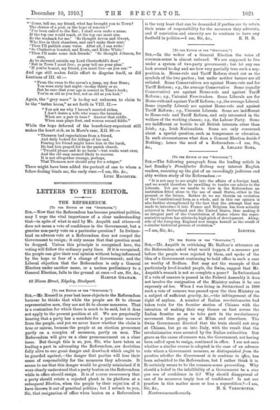[To THE EDITOR OF THE " SPECTATOR."1 SIE,—Mr. Rusiell in
your last issue objects to the Referendum because he thinks that while the people are fit to choose representative men, they are not fit to choose measures. That is a contention for which there is much to be said, but it does not apply to the present position at all. We are perpetually hearing that a party has a mandate for a particular measure from the people, and yet we never know whether the claim is true or untrue, because the people at an election pronounce partly on a complex of measures, partly on men. The Referenduin will give us a clear pronouncement on a clear issue. But though this is so, you, Sir, who have taken so leading a part in advocating the Referendum, are doubtless fully alive to one great danger and drawback which ought to be guarded against, the danger that parties will lose their sense of responsibility for the measures they advocate. It seems to me that this danger would be greatly minimised if it were clearly understood that a party beaten on the Referendum while in office should resign. It is of course unnecessary that a party should retain a rejected plank in its platform at a subsequent Election, when the people by their rejection of it have thrown it out of practical politics; but I submit to you, Sir, that resignation of office when beaten on a Referendum
is the very least that can be demanded if parties are to retain their sense of responsibility for the measures they advocate, and if conviction and sincerity are to continue to have any
foothold in politics.—I am, Sir, &c., E. H. B.


























































 Previous page
Previous page